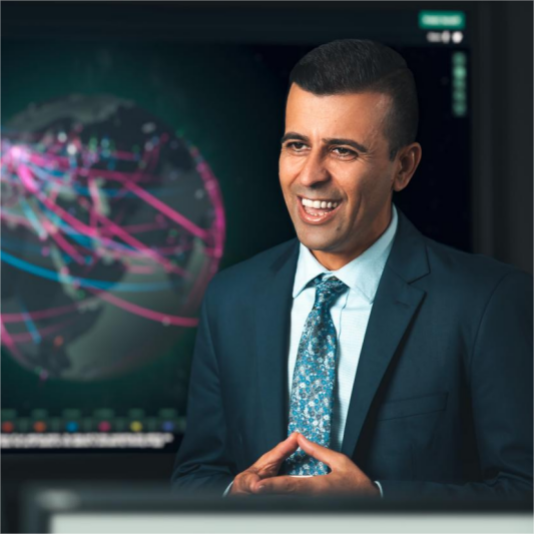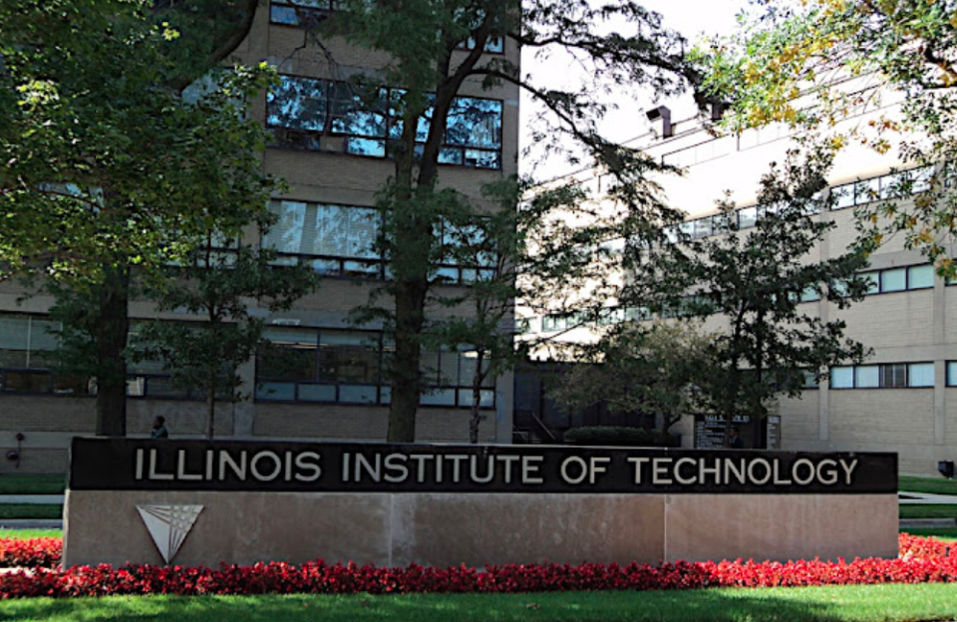Title:
Intelligent Transportation and Mechatronics Technology
Date:
October 25th, 2025 (UTC-6)
Organizer:
ITM Department, Illinois Institute of Technology, USA
Symposium Chair:

Dr. Marwan Omar
Personal Bio:
Dr. Marwan Omar's academic career has consistently focused on applied, industry-relevant cyber security, data analytics, machine learning, application of AI to cyber security and digital forensics research and education that delivers real-world results. He brings a unique combination of industry experience as well as teaching experience gained from teaching across different cultures and parts of the world. He has an established self-supporting program in machine learning application to cyber security. He has established a respectable research record in AI and cyber security exemplified in the dozens of published papers and book chapters that have gained recognition among researchers and practitioners (more than 272 Google scholar citations thus far). He is actively involved in graduate as well as undergraduate machine learning education including curriculum development and assessment.
Dr. Omar has recently published two books with Springer on Machine Learning and Cyber Security and has also published research with IEEE conference on Sematic Computing. Additionally, Dr. Omar holds numerous industry certifications including Comptia Sec+, ISACA CDPSE, EC-Council Certified Ethical Hacker, and SANS Advanced Smartphone Forensics Analyst.
Dr. Omar has been very active and productive in both academia as well as the industry and he is currently serving as an associate professor of cyber security at Illinois Institute of Technology.
Call for Papers
Background:
Intelligent Transportation Systems (ITS) represent the integration of advanced information, communication, and sensing technologies into transportation networks to improve safety, efficiency, and sustainability. By leveraging real-time data collection, wireless communication, and automation, ITS applications enable vehicles, infrastructure, and users to interact in smarter ways. These systems have evolved from early traffic signal coordination to complex networks supporting adaptive traffic control, connected vehicles, electronic tolling, and smart public transit. In the context of growing urbanization, rising traffic congestion, and environmental concerns, ITS offers innovative solutions such as incident detection, route optimization, and dynamic traffic management. Furthermore, the emergence of artificial intelligence, edge computing, and 5G connectivity has expanded the capabilities of ITS, making it central to the vision of smart cities. Understanding ITS theory and applications provides transportation engineers with the tools to design resilient, user-centric mobility systems that balance efficiency, safety, and sustainability in modern transportation networks.
Goal/Rationale:
The primary goal of this workshop on Intelligent Transportation Systems (ITS) Theory and Applications is to provide participants with a strong conceptual and practical foundation in modern ITS technologies. By bridging theory with real-world applications, the workshop aims to prepare transportation engineers, researchers, and practitioners to design, implement, and evaluate intelligent mobility solutions that address today’s pressing challenges in transportation.
Participants will explore the theoretical underpinnings of ITS, including system architecture, communication protocols, and data-driven decision-making models. The workshop also emphasizes applied learning through case studies and discussions of contemporary ITS applications, such as adaptive traffic signal control, advanced traveler information systems, connected and autonomous vehicles, and smart public transit management.
A key goal is to highlight how ITS contributes to safer, more efficient, and more sustainable transportation networks, aligning with broader societal objectives of reduced congestion, lower emissions, and improved accessibility. Finally, the workshop seeks to foster cross-disciplinary collaboration by bringing together perspectives from engineering, computer science, and urban planning, enabling participants to better understand how ITS integrates into the vision of smart cities. By the end of the workshop, attendees will be equipped with the knowledge and tools needed to contribute to the next generation of intelligent mobility systems.
Scope and Information for Participants:
This workshop on Intelligent Transportation Systems (ITS) Theory and Applications is designed to cover both the fundamental principles and practical applications of ITS in modern transportation engineering. The scope includes an introduction to ITS architecture, data collection and communication technologies, system integration, and emerging applications such as connected vehicles, adaptive traffic management, and smart mobility services. Special emphasis will be placed on how ITS supports safer, more efficient, and sustainable transportation networks.
Participants will gain exposure to case studies, interactive discussions, and examples of real-world ITS deployments that illustrate the challenges and opportunities in the field. No prior expertise in ITS is required, though a background in transportation or civil engineering will help participants engage more deeply with technical content. Attendees are encouraged to actively participate in discussions, ask questions, and consider how ITS solutions can be applied within their own professional or academic contexts.
Topics:
The main topics of this symposium are listed below.
Transportation Engineering
- Carrier Operation Engineering
- ITS Theory and Applications
- Low-carbon Transportation Technology
- Modern Logistics System Planning and Optimization
- Road and Railway Engineering
- Transportation and Social Economic Development
- Transportation Planning, Construction and Operation Organization
Meanwhile, submissions aligned with the overall conference theme are also welcome.
Functional Materials
- Advanced Materials and Technologies
- Advanced Materials Processing and 3D Printing
- Advanced Nanomaterials and Graphene
- Biomaterials
- Electric and Magnetic Materials
- Emerging Materials
- Energy Materials
- Glasses, Ceramics and Composites
- Material Mechanics and Structure
- Material Thermodynamics
- Metal and Alloy
- Optic and Acoustic Materials
- Polymer Science and Engineering
- Semiconductors and Super Conductors
- Smart Materials and Structures
Civil Engineering
- Bridge Engineering
- Cartography and Geographic Information System
- Computational Mechanics
- Disaster Prevention and Mitigation
- Environment-Friendly Construction and Development
- Geological Engineering
- Heating, Gas Supply, Ventilation and Air Conditioning Works
- Monitoring and Control of Structures
- Reliability and Durability of Structures
- Seismic Engineering
- Structural Engineering
- Structural Rehabilitation, Retrofitting and Strengthening
- Surveying Engineering
- Tunnel, Subway and Underground Facilities
- Water Supply and Drainage Engineering
Energy Engineering
- Alternative Fuels
- Hydroelectric and Geothermal Power
- Integrated Energy Systems
- Nanotechnology Applications
- Nuclear Materials and Fuels
- Solar Cell Technology
- Solar Electricity and PV Applications
- Solar Thermal Applications
- Machine Design
- Mechanical CAD/CAM
- Mechanical Power Engineering
- Mechanical Dynamics
- Integrated Manufacturing
- Advanced Intelligent Mechatronics
Submission:
Prospective authors are kindly invited to submit full papers that include title, abstract, introduction, tables, figures, conclusion and references. It is unnecessary to submit an abstract in advance. Please submit your papers in English.
Each paper should be no less than 4 pages. One regular registration can cover a paper of 6 pages, and additional pages will be charged. Please format your paper well according to the conference template before submission. Paper Template Download
Please prepare your paper in both .doc/.docx and .pdf format and submit your full paper by email with both formats attached directly to [email protected]
Important Dates:
| Process | Date & Time |
|---|---|
| Submission Deadline | October 17, 2025 |
| Symposium Date | October 25, 2025 |
| Notification of Acceptance | 7-20 workdays |
Publication:
Accepted papers of the symposium will be published in Advances in Transdisciplinary Engineering (ATDE) (Print ISSN 2352-751X), and will be submitted to EI Compendex, Conference Proceedings Citation Index (CPCI), Crossref, CNKI, Portico, Engineering Village (Inspec), Google Scholar, and other databases for indexing. The situation may be affected by factors among databases like processing time, workflow, policy, etc.
Publication info
Title: Advances in Transdisciplinary Engineering (ATDE)
Press: IOS Press
ISSN: 2352-751X, 2352-7528 (electronic)
This symposium is organized by CONF-FMCE 2025 and it will independently proceed the submission and publication process.
* Please note that the publication policy may vary between different publishers. For details regarding the publication process, kindly refer to the policies of the respective publisher.
Ways to Participate
Venue:
Illinois Institute of Technology, 10 W 35th St, Chicago, IL 60616
Attend in Person:
If you want to attend the symposium on-site, please email [email protected]. The symposium seats are limited. Both contributors and non-contributors who wish to participate in the symposium in person need to apply to the symposium organizers.
VISA:
U.S. Visas (state.gov)In order to ensure the information is correct and up to date, there may be changes which we are not aware of. And different countries have different rules for the visa application. It is always a good idea to check the latest regulations in your country. This page just gives some general information of the visa application.
US Visa Information
The B-1/B-2 visitor visa is for people traveling to the United States temporarily for business (B-1) or for pleasure or medical treatment (B-2). Generally, the B-1 visa is for travelers consulting with business associates; attending scientific, educational, professional, or business conventions/conferences; settling an estate; or negotiating contracts. The B-2 visa is for travel that is recreational in nature, including tourism; visits with friends or relatives; medical treatment; and activities of a fraternal, social, or service nature. Often, the B-1 and B-2 visas are combined and issued as one visa: the B-1/B-2.
Application Items
If you apply for a business/tourist visa, you must pay your $160 application fee and submit the following:
- A Nonimmigrant Visa Electronic Application (DS-160) Form. Visit the DS-160 web page for more information about the DS-160.
- A passport valid for travel to the United States with a validity date at least six months beyond your intended period of stay in the United States (unless country-specific agreements provide exemptions). If more than one person is included in your passport, each person desiring a visa must submit an application.
- One (1) 2 x 2 inches (51 x 51 mm) photograph taken within the last six months.
- If a visa is issued, there may be an additional visa issuance reciprocity fee, depending on your nationality.
In addition to these items, you must present an interview appointment letter confirming that you booked an appointment through this service. You may also bring whatever supporting documents you believe support the information provided to the consular officer.
Supporting Documents
- Invitation letter from business or school.
- Detailed CV or resume including a list of publications.
- Complete itinerary, including all meetings, conferences, and visits; include names, addresses, and telephone numbers of your hosts.
- For other materials, please refer to the U.S. Embassy or Consulate website.
NOTICE:
Should your application be denied, the organizing committee cannot change the decision of visa officer, nor will CONF-FMCE engage in discussion or correspondence with the visa application center on behalf of the applicant. The registration fee CANNOT be refunded when the VISA application of individual being denied.
